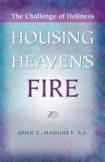A Universal Call
John Haughey’s métier is giving new life to moribund theological terms or those worn threadbare by overuse. He strips terms bare, reconstitutes them and then often stuns us with the precision of a polished and sometimes newly minted vocabulary.
The starting point and purpose of Haughey’s latest book is to enchant the reader with the fact and fire of holiness. Holiness, he says, is not only a fact, something received from God, but it is also a task, a call to house, to make a home for what God has initiated.
Haughey is curious about the last time any one of us was enchanted with holiness. For most, he thinks it probably was not any time recently, and he has some good ideas as to why that is so. He knows that holiness is easily perceived as lofty, unrealistic, insufficiently hard-nosed, escapist and the territory of professional religious types. He is aware that themes associated with holinessgrace and perfection, for exampleroutinely get lost in terminological squabbles among theologians. Most important of all, he identifies the underdevelopment of a theology of the Holy Spirit as the main culprit behind our misconceptions about holiness. To put it simply, the experience of holiness relies on the Holy Spirit to mediate it, inspire it and bring it to birth.
The sweep of this book is impressive, especially in view of its brevity. It begins with Genesis and ends with a consideration of current human rights documents and movements. Along the way, Haughey quotes selectively and from the best. From Abraham Heschel’s classic meditation he reminds us that for Israel, the call to holiness was housed in observing the Sabbath. (Who can forget that six days of God’s labor were called good, and only the Sabbath was called holy?) From Deuteronomy, Haughey proposes that holiness was not something to be snagged by the law and the letter of the law but rather through love. And from Job, Haughey traces how suffering leads the fortunate ones among us through detachment, humility and fear of the Lord to holiness. The painful struggle, he has us believe, is worth every drop of blood, sweat and tears shed along the way.
Convinced that we spend too much time focused on whether we have faith in Jesus, Haughey turns the tables in a later chapter and places the focus on whether Jesus himself had faith. The shift in perspective allows him to deal with the tough questions that a Christology from above avoids. Without ever denying Jesus’ divinity, Haughey uses a Christology from below first to disenchant a Jesus with all the answers and then to re-enchant an attractive fully human Jesus who learned the way we do, with a consciousness that is the same as ours. The Jesus who emerges is one who lived by faith and not by sight.
The tour de force of this Christological inquiry, however, rests with how the Holy Spirit trues Jesus. Borrowing the archaic word truing from carpenters and construction workers who trued, or aligned, one entity with another for a perfect fit, Haughey suggests it is the Spirit who trued Jesus, deftly bending each aspect of his humanity to become...the instrument God needed for the salvation of the world.
Followers of Jesus also need to be trued, and Haughey thinks no one shows the way this is done better than Ignatius of Loyola. From his own experience, Ignatius learned that monitoring the tiers of his desires was the key. In the early stages of his conversion, he noted narcissistic desires that controlled him and true beliefs that were present but dormant within him. Through the Spiritual Exercises, Ignatius offered his followersthen and nowa way to bring vagrant desires into alignment with true desires of the heart. The result for the early Jesuits was that they housed heaven’s fire and burned with the love of Christ. That possibility, Haughey says, is open to all of us.
As an ethicist, Haughey rounds out this book with attention appropriate to his area of specializationnamely, issues of solidarity that involve a balance between personal rights and common responsibilities. People become holy not one by one or vertically but horizontally and together. But holiness is also very much wrapped up with things of the earththose things with which God has been loving us all our life long. Tragically, we share corporate responsibility for mutilating, defacing and disenchanting these gifts. A theological ecology, still in its embryonic stages, will be the vehicle to remind us that it is all of creation, not only people, destined to give God glory.
The integration of God’s glory and our holiness will be more fully realized when human rights are incorporated into our faith as Catholics. The groundwork has been present all along in the Gospels, especially in the Beatitudes that Haughey considers to be the bedrock of a contemporary human rights theology. What remains is for the holiness template found in the Gospels to be trued with the holiness metanarratives of other faiths. The hope for our futurethe future of a whole and holy worldlies in unified cries of justice by all and for all in God’s name. The hope of Housing Heaven’s Fire is for that glorious day to come soon.
In the meantime, this book is commended to all serious readers who welcome a little enchantment in their lives. It will not disappoint.
This article also appeared in print, under the headline “A Universal Call,” in the March 3, 2003, issue.








